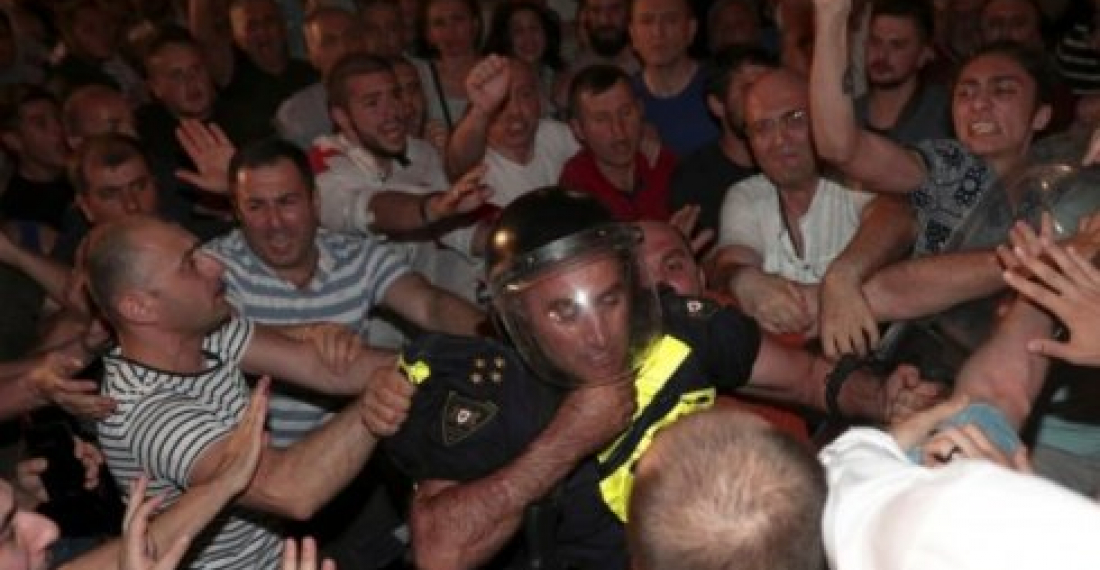This is a commentary prepared by the political editor of commonspace.eu
20 June was a sad day for Georgian politics. It started with a political blunder, and ended in an orgy of rioting that left dozens injured.
Parliamentary diplomacy is an important tool of foreign policy. If properly used it can contribute to understanding between nations and help solve many problems. So the decision of the Georgian parliament to host a meeting of the Inter-Parliamentary Assembly on Orthodoxy, including a Russian delegation, was not in itself wrong, indeed in many ways it was laudable.
The sensitivity of having a Russian parliamentary delegation in the Georgian parliament - even though the two countries have no diplomatic relations and Georgia still considers Russia as an occupant country with regards to its policy and presence in Abkhazia and South Ossetia - should have however been obvious to everyone. It should not necessarily have been avoided, but it certainly needed to be managed. Instead, a member of the Russian State Duma was casually led to the seat usually reserved for the chairman of Parliament in order to chair the session of the Orthodox parliamentarians. That was too much for some, they protested, and the meeting was disrupted.
Things should have stopped there. Instead the opposition decided that this was the moment to bring the people out on the streets for what they saw as an affront to Georgian statehood. Peaceful protest soon turned into rioting which lasted all night. Dozens were injured, including protestors and policemen.
This episode does not reflect well on any side. The Georgian government, and especially the leadership of the parliament, were sloppy in their management of the whole affair. There should have been red faces all round. But that did not justify red blood on the streets. Those who brought people out on the streets also need to assess their wisdom. The conduct of the law enforcement officers also needs to be assessed. Was there excessive use of force, or were the police responding to a dangerous break in public order, led by some who have been quite openly advocating for public unrest to bring down the government? An independent inquiry should establish the facts.
In the meantime, everyone should calm down and take a step back. Georgia in 2019 is not Georgia in 1989, or even 1999. The country has built for itself a good track record for reforms, across governments of various persuasions, and the democratic process, whilst far from perfect, develops in earnest. During the night the EU delegation to Georgia and the US embassy issued a joint statement in which they recognised the hurt that many people felt in Tbilisi yesterday. "We urge all sides to remain calm, show restraint and act within the framework of the Constitution at all times", the statement said.
Three things should be kept in mind:
Georgia may well be ready for another change of government, but this needs to be done through the ballot box not through rioting. Georgia's international friends and partners expect no less.
Law enforcement in any democratic country is not easy. It often needs to be robust. But it can never be excessive. The incidents on 20/21 June should be subject to a proper inquiry.
It has been noticeable for some time that the Georgian people are becoming increasingly irritated with their politicians - both government and opposition. This is not good for democracy and the country. Increased polorisation and use of vitriolic language, noted by international observers in recent elections, are causing great harm to the political system. More reasonable voices need to be heard, and be given more space. Georgia's international partners should not shy away from saying this more vocally. The cost of not doing so is simply too high.
Finally, statements coming out from Russian political and government sources over the last 24 hours have exacerbated the situation. Russia has a lot to answer for in Georgia. Its politicians may do well by examining why anti-Russian feeling runs so high in Georgia, and start taking steps to correct the big errors that they have made over the last three decades Russian policy has left Georgia a traumatised country - trauma that sometimes bursts out in episodes as we saw yesterday.
This commentary was prepared by the political editor of commonspace.eu
photo: portestors outside the georgian parliament on 20 june 2019 (picture courtesy of BBC, London.






